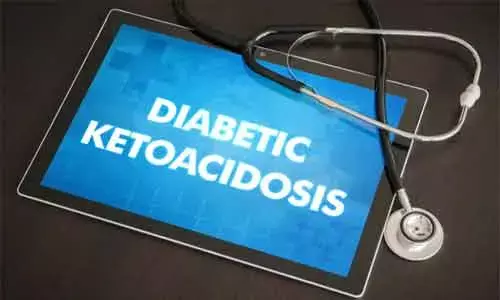- Home
- Medical news & Guidelines
- Anesthesiology
- Cardiology and CTVS
- Critical Care
- Dentistry
- Dermatology
- Diabetes and Endocrinology
- ENT
- Gastroenterology
- Medicine
- Nephrology
- Neurology
- Obstretics-Gynaecology
- Oncology
- Ophthalmology
- Orthopaedics
- Pediatrics-Neonatology
- Psychiatry
- Pulmonology
- Radiology
- Surgery
- Urology
- Laboratory Medicine
- Diet
- Nursing
- Paramedical
- Physiotherapy
- Health news
- Fact Check
- Bone Health Fact Check
- Brain Health Fact Check
- Cancer Related Fact Check
- Child Care Fact Check
- Dental and oral health fact check
- Diabetes and metabolic health fact check
- Diet and Nutrition Fact Check
- Eye and ENT Care Fact Check
- Fitness fact check
- Gut health fact check
- Heart health fact check
- Kidney health fact check
- Medical education fact check
- Men's health fact check
- Respiratory fact check
- Skin and hair care fact check
- Vaccine and Immunization fact check
- Women's health fact check
- AYUSH
- State News
- Andaman and Nicobar Islands
- Andhra Pradesh
- Arunachal Pradesh
- Assam
- Bihar
- Chandigarh
- Chattisgarh
- Dadra and Nagar Haveli
- Daman and Diu
- Delhi
- Goa
- Gujarat
- Haryana
- Himachal Pradesh
- Jammu & Kashmir
- Jharkhand
- Karnataka
- Kerala
- Ladakh
- Lakshadweep
- Madhya Pradesh
- Maharashtra
- Manipur
- Meghalaya
- Mizoram
- Nagaland
- Odisha
- Puducherry
- Punjab
- Rajasthan
- Sikkim
- Tamil Nadu
- Telangana
- Tripura
- Uttar Pradesh
- Uttrakhand
- West Bengal
- Medical Education
- Industry
Insignificant increase in A1C in those with and without diabetes after COVID-19 infection

There is statistically significant but clinically insignificant increase in A1c in people following COVID-19 infection in both those with and without diabetes, according to a new retrospective, observational, case-control study of more than 20,000 people from a single US medical center.
The study has shown a statistically significant but clinically insignificant increase in A1c in people following COVID-19 infection, in both those with and without diabetes. Further after receiving a diagnosis of COVID-19 infection patients were 40% more likely to also receive a diagnosis of type 2 diabetes compared with people who tested negative for COVID-19, a difference that was significant and could be explained by the increased medical care received by people who test positive for COVID-19. The study published in medRxiv.org further found that risk of incident diabetic ketoacidosis (DKA) among people who tested positive for COVID-19 was significantly higher among those with preexisting type 2 diabetes, those using insulin, and among Black individuals.
Until now the impact of COVID-19 infection on A1c remained unclear. Results from previous studies indicated that COVID-19 infection may increase A1c levels, but the studied cohorts were small and lacked uninfected controls.
In the study researchers retrospectively selected patients with an A1c recorded within 12 months before their COVID-19 test as well as a second A1c value recorded within 12 months after COVID-19 testing. This produced a study cohort of 8755 COVID-positive people and 11,998 matched people who tested negative for COVID-19. Thea data came from a Cleveland Clinic registry that included 81,093 people who tested positive for COVID-19 between March 2020 and May 2021 and 153,034 matched individuals who tested negative for COVID-19 during the same period. The authors identified two sub-cohorts that excluded those with a history of DKA. The sub-cohorts were 701 people with type 1 diabetes, and 21,830 with type 2 diabetes to evaluate risk of DKA.
The investigators found a statistically significant but clinically insignificant A1c increase following a positive COVID-19 test in people with and without type 2 diabetes prior to infection, an average A1c increase of 0.06 percentage points. Those who tested negative for COVID-19 had a clinically insignificant change in their average A1c level that was of borderline statistical significance, an average increase of 0.02 percentage points, P = .0. The researchers saw significant positive associations between higher A1c levels before infection and time to hospitalization (hazard ratio, 1.07), need for assisted breathing (HR, 1.06), and ICU admission (HR, 1.07) in patients with type 2 diabetes who became infected with COVID-19.
Among the 21,830 people with preexisting type 2 diabetes, the DKA risk was a significant 35% greater for those who were infected with COVID-19 compared with those who were uninfected. The magnitude of this increased relative risk was even higher among the patients with type 2 diabetes who used insulin as part of their treatment. The difference in DKA risk didn't differ between Black and White patients who were not infected with COVID-19, but among those infected by COVID-19, Black patients were more than twice as likely to be diagnosed with DKA compared with White patients, a significant difference. Blacks diabetics with COVID-19 infection had a significant 63% increased rate of DKA compared with Black patients with type 2 diabetes who remained uninfected.
The clinical interpretation of the study is that DKA risk is increased in T2D patients on insulin and in Black patients with T2D after COVID-19 infection.T2D risk is greater in COVID-19(+) patients for the same HbA1c increase in COVID-19(-) patients, indicating that T2D risk attributed to COVID-19 may be due to increased recognition during COVID-19 management.
For further reference log on to:
doi: https://doi.org/10.1101/2022.03.08.22272041
Dr Kamal Kant Kohli-MBBS, DTCD- a chest specialist with more than 30 years of practice and a flair for writing clinical articles, Dr Kamal Kant Kohli joined Medical Dialogues as a Chief Editor of Medical News. Besides writing articles, as an editor, he proofreads and verifies all the medical content published on Medical Dialogues including those coming from journals, studies,medical conferences,guidelines etc. Email: drkohli@medicaldialogues.in. Contact no. 011-43720751


